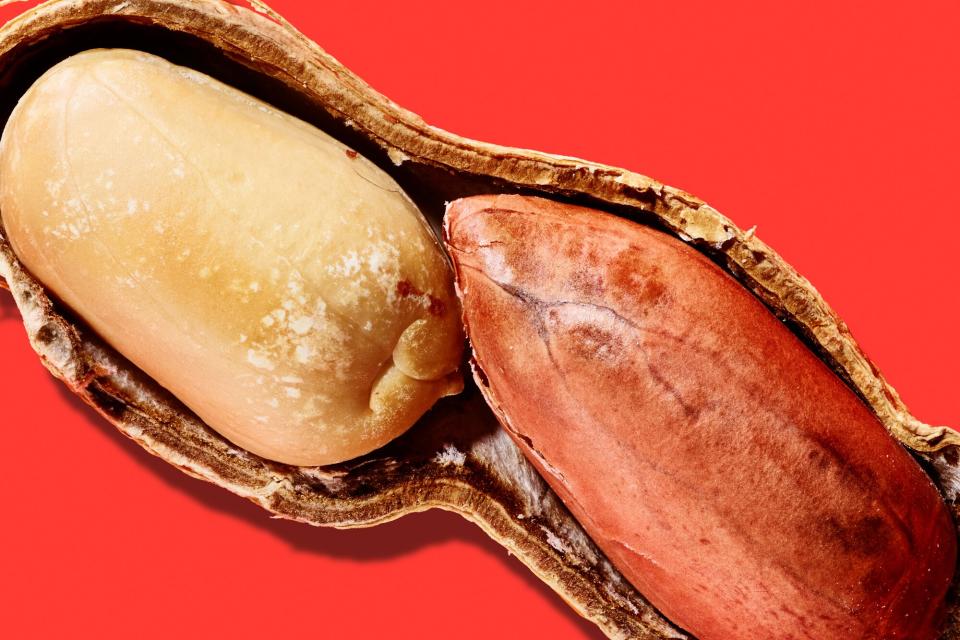Are Peanuts Healthy? Here's What a Dietitian Has to Say
Peanuts are a staple in many kitchens, most often found in the form of peanut butter. But in recent years, it seems like almonds, cashews and other nuts are getting all the attention. Just think of the number of alternative nut butters and nondairy milks on the grocery store shelves! It might make you wonder if peanuts are even healthy. Here we'll answer just that (spoiler alert: they are) by taking a deep dive into their nutrition breakdown and health benefits. Plus, we'll share some creative ways to include them on your plate.
Nutrition of Peanuts
Peanuts are affordable, shelf-stable, filling and nutritious. Peanut butter, and peanuts in general, can be used in a range of sweet and savory dishes, from Pantry Peanut Noodles to No-Bake Peanut Butter Chocolate Cookies.
The nutrition information for 1 ounce of raw (not roasted), no-salt-added peanuts includes:
160 calories
7g protein
14g fat
5g carbs
2.4g fiber
68mcg folate (17% Recommended Dietary Allowance)
49mg magnesium (15% RDA)
196mg potassium (8% RDA)
0.7mg iron (4% RDA)
3mg sodium
Peanuts are an energy- and nutrient-dense food. They boast the satiating combo of fiber, protein and fat to help keep you feeling energized after a meal. And they deliver an impressive dose of important nutrients like folate, magnesium, potassium and iron. When raw (as in not roasted) and unsalted, they only contain 3 milligrams of sodium per serving.
Roasting peanuts increases the fat content by approximately 0.3 grams per serving. And salted peanuts can contain more than 100 mg of sodium per serving, which is quite a lot, given that the daily recommended limit for sodium is 2,300 mg (and 1,500 mg for people with high blood pressure or heart disease). There are also options for lightly salted peanuts (and other nuts) nowadays, which helps bring the sodium down, usually below 50 mg per serving.

Getty Images / Maren Caruso
5 Health Benefits of Peanuts
1. They're packed with antioxidants
Research has identified peanuts as a "functional food," pointing out the variety of antioxidants they contain. These antioxidants include phenolic acids and flavonoids, which are also found in types of green and black teas, apples, red wine and soybeans. And, surprisingly, peanut skins are higher in antioxidants than the whole peanut, which is a great reason to buy them in their shells and enjoy shelling them yourself.
Research has shown that peanuts' anti-inflammatory benefits may help reduce the risk of various conditions like diabetes, cardiovascular disease and even certain types of cancers. So top your salad or soup with some crushed peanuts, and slather some peanut butter on your morning slice of toast!
2. They can help make it easier to lose weight and maintain a healthy weight
Though they might seem high in calories, nuts (including peanuts) are a great snack if you are trying to lose weight or maintain a healthy weight. The combination of protein, fiber and healthy fats found in peanuts can help keep you feeling full and satisfied between meals. This may help you get ahead of hunger and prevent overeating.
In fact, research has found that nuts might play an important role in weight regulation, and have found inverse relationships between obesity and nut consumption (meaning the more often you eat nuts, the less likely you are to be obese). One study found that including 1 ounce of peanuts per day not only improved diet quality, but also helped improve healthy weight maintenance.
3. They're heart healthy
Peanuts have a mix of soluble and insoluble fiber that provides a slew of heart-healthy benefits, one of which is helping lower LDL, or "less healthy" cholesterol levels. Peanuts also contain niacin (vitamin B3), which is important for healthy heart function. One study found that consuming just over 1 ounce of peanuts per day (42g) for 12 weeks helped participants reduce blood pressure, cholesterol and triglyceride levels. Plus, the anti-inflammatory effects of the antioxidants in peanuts can help lower the risk of coronary heart disease.
4. They can help balance blood sugar
Research has found that nuts, including peanuts, can help reduce diabetes risk and improve outcomes for people who already have diabetes. In fact, one recent review of studies found that eating peanut butter specifically was inversely associated with developing type 2 diabetes, as if you needed yet another reason to add delicious peanut butter to your toast or enjoy it with some fruit. Another study found that snacking on nuts, like peanuts, could help reduce risk of complications for those with existing diabetes, too. People who increased their nut consumption after a diabetes diagnosis had an 11% lower risk of cardiovascular disease, a 15% lower risk of coronary heart disease and a 27% lower risk of all-cause mortality.
5. They're environmentally friendly
Peanuts are one of the most affordable nuts on the market. Although prices rose during the pandemic, generally you can get peanuts or peanut butter for less than 20 cents per serving. Not only are they budget-friendly, but also they boast some environmental benefits. Growing 1 ounce of peanuts only requires roughly 3.2 gallons of water, compared to the 28.7 gallons of water needed to grow an ounce of almonds. Peanuts are also nitrogen-fixing plants, meaning they take nitrogen from the atmosphere and return it to the soil for other plants to use as fuel (they do this through bacteria that grow in their roots, called rhizobium). Since peanuts are affordable, widely available and take a minimal toll on the environment compared to other nuts, they might be the most sustainable nut around.
The Bottom Line
Peanuts are nutritious, affordable and have been a pantry staple for many of us for as long as we can remember. Regular consumption may also improve heart health, lower diabetes risk and promote a healthy weight. Plus, they take a smaller toll on the environment compared to other popular types of nuts.

